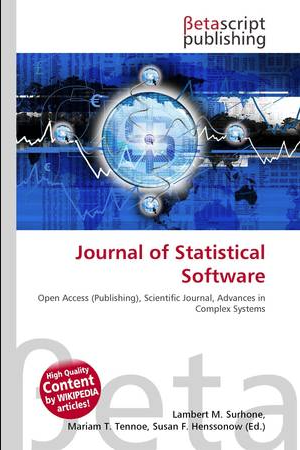Nonparametric Machine Learning and Efficient Computation with Bayesian Additive Regression Trees: The BART R Package
IF 8.1
2区 计算机科学
Q1 COMPUTER SCIENCE, INTERDISCIPLINARY APPLICATIONS
引用次数: 72
Abstract
In this article, we introduce the BART R package which is an acronym for Bayesian additive regression trees. BART is a Bayesian nonparametric, machine learning, ensemble predictive modeling method for continuous, binary, categorical and time-to-event outcomes. Furthermore, BART is a tree-based, black-box method which fits the outcome to an arbitrary random function, f , of the covariates. The BART technique is relatively computationally efficient as compared to its competitors, but large sample sizes can be demanding. Therefore, the BART package includes efficient state-of-the-art implementations for continuous, binary, categorical and time-to-event outcomes that can take advantage of modern off-the-shelf hardware and software multi-threading technology. The BART package is written in C++ for both programmer and execution efficiency. The BART package takes advantage of multi-threading via forking as provided by the parallel package and OpenMP when available and supported by the platform. The ensemble of binary trees produced by a BART fit can be stored and re-used later via the R predict function. In addition to being an R package, the installed BART routines can be called directly from C++. The BART package provides the tools for your BART toolbox.非参数机器学习和贝叶斯加性回归树的高效计算:BART R包
在本文中,我们将介绍BART R包,它是贝叶斯加性回归树的缩写。BART是一种贝叶斯非参数、机器学习、集成预测建模方法,用于连续、二进制、分类和时间到事件的结果。此外,BART是一种基于树的黑箱方法,它将结果拟合到协变量的任意随机函数f中。与竞争对手相比,BART技术的计算效率相对较高,但是大样本量可能要求很高。因此,BART包包括高效的最先进的实现,可以利用现代现成的硬件和软件多线程技术,实现连续、二进制、分类和时间到事件的结果。BART包是用c++编写的,以提高编程效率和执行效率。BART包利用了并行包和OpenMP在平台可用和支持时提供的通过分叉的多线程。由BART拟合产生的二叉树集合可以通过R预测函数存储和重用。除了是R包之外,已安装的BART例程还可以直接从c++调用。BART包为您的BART工具箱提供了工具。
本文章由计算机程序翻译,如有差异,请以英文原文为准。
求助全文
约1分钟内获得全文
求助全文
来源期刊

Journal of Statistical Software
工程技术-计算机:跨学科应用
CiteScore
10.70
自引率
1.70%
发文量
40
审稿时长
6-12 weeks
期刊介绍:
The Journal of Statistical Software (JSS) publishes open-source software and corresponding reproducible articles discussing all aspects of the design, implementation, documentation, application, evaluation, comparison, maintainance and distribution of software dedicated to improvement of state-of-the-art in statistical computing in all areas of empirical research. Open-source code and articles are jointly reviewed and published in this journal and should be accessible to a broad community of practitioners, teachers, and researchers in the field of statistics.
 求助内容:
求助内容: 应助结果提醒方式:
应助结果提醒方式:


